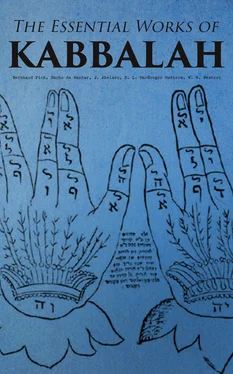Again, on another occasion, Rabbi Simeon spake and said: "Bereshith bara Alhim" (In the beginning created God). These words require great thought and consideration, for everyone that says there is another God is cut off from the world, as it is written: "Thus shall he say unto them, the gods that have not made the heavens and the earth, even they shall perish from the earth and from under these heavens" (Jer. x. 11), for there is other God beside the Holy One.
This verse is in the Chaldee tongue excepting the last word, Aleh (these) which is in Hebrew. Why? It might be said, in order that the holy angels should not comprehend its signification of the divine unity. The true reason is that they might not become envious of man and thus cause him to suffer, for in the words, "the gods that have not made the heavens and the earth" have reference to certain angels who fell from heaven and set themselves up as gods.
Now the word earth which in Hebrew is arqa, in the Chaldee is arca; why so? Because it is one of the seven lower worlds where reside the descendants of Cain. After his expulsion from the earth, he went thither and begat children. This arqa was partly lighted and partly enshrouded in darkness and governed by two chiefs who were constantly warring against each other. On the arrival of Cain, however, they entered into an alliance of friendship for they perceived that it was to him they owed their existence. They became one body with two heads, the name of the one was Aphira , and Qastimon , the name of the other; this ruled over the dark, that over the light parts of Arqa. Before becoming joined together, they were like angels with six wings, Aphira having the form of an ox, Qastimon that of an eagle. On their union, they took on them the human form and begat offspring like unto themselves. When they found themselves in darkness, they became changed into the form of a serpent with two heads, and crawling as a serpent they plunged into the great sea, the abode of demons, where they found the decadent angels Azar and Azael and expelled them from their lurking places. These then fled and hid themselves in dark mountains thinking that the Holy One was about to execute vengeance open them for their evil doings and conduct. After this, the two chiefs Aphira and Qastimon swam through the great sea and went to visit Naamah, the mother of the demons, and the first deceiver and seducer of holy angels, who after their fall took different human forms and in their turn became corruptors of mankind. After roaming through the world they returned to Arqa, and now their great object is to corrupt the descendants of Cain and lead them into sin. Respecting this Arqa, the heaven with its various constellations and stars is altogether different from our visible heavens at night. The seasons for sowing and reaping are not the same as ours in their sequence and regularity, being separated by a considerable number of years; these two chiefs of Arqa are they to whom the Scripture refers, who posing as gods shall become exterminated from our Thebel or earth on which they shall not exercise any dominion, nor afflict the children of man during the night, but as saith the Scripture: "They shall be destroyed by Aleh, by whom the heavens and the earth have been created". This is why Aleh in this verse is written in Hebrew, designating the holy name untranslatable into the Chaldee language.
Then said Rabbi Eleazar to his father: What meaneth the words: "Who would not fear thee, Oh King of nations?" (Jer. x,, 7). Who is this King of Nations or Gentiles?
Said Rabbi Simeon: "This verse, my son, has been interpreted in various ways, but all alike erroneous, as is proved by the remaining portion of tine verse, "among all the wise men of the nations and in all their kingdoms, there is none like unto thee," which closes the mouth of the ungodly who imagine that the Holy One knoweth not and is not acquainted with the thoughts of their hearts. We will now refute their error.
A Gentile philosopher came to me one day, saying: You say that your God rules in the heavens on high and that all the angelic hosts cannot approach him or form a conception of his being. The words of this verse add no dignity to his glory. What glory and eminence can be ascribed to a deity who cannot be found and located amongst mankind. Furthermore, you declare: "And there arose not a prophet since in Israel like unto Moses" (Deuter. xxxiv. 10), from which it may be inferred that though no such prophet as he rose in Israel, yet it does not apply to the Gentiles, amongst whom I venture to maintain there have appeared many as great and equal to him. From these words of Jeremiah I conclude therefore that only amongst the wise men of the Gentiles there is none like unto God, but that in Israel there have been many like unto him; consequently, he could not be from this similarity their superior or master. Think well over my words and you will confess that I have reasoned logically and correctly.
My reply to him was thus: 'It is true what thou sayest, that in Israel there have been some sages like unto God. Who raiseth the dead to life again? Is it not God only? Yet both Elijah and Elisha brought the dead to life again. Who maketh the rain descend, but God only? Yet by his prayer Elijah caused it to cease and descend. Who is it but the Holy One that made the heavens and the earth? Yet Abraham came, and by him they were established. Who rules the course of the sun? Is it not the Holy One? Yet Joshua commanded it to stand still as it is written: "And the sun stood still" (Josh. x., 13). The Holy One gave decrees, so also did Moses, and they were established and conformed. Again the Holy One decreed punishments, but the just men of Israel caused them to cease or be turned aside, as it is said: "The righteous man ruleth in the fear of God" (II. Sam. xxiii., 3). Moreover, he commanded the just to walk in his way and to become like him. On hearing these words the philosopher turned away and went to the village of Shehalim, where he became known as the Little Joshua. There he applied himself to the study of the secret doctrine and eventually became one of the sages and chief men in that place.
Let us now return to the exposition of the words: "All the nations before him are as nothing." (Isa. 40:17) What do they mean? As also: "Who would not fear thee, Oh King of the Gentiles." What is their signification? Is God then the King of the Gentiles and not of Israel? Yea, the Holy One everywhere wishes to be glorified and worshipped by Israel and his name to be attached to Israel only, as it is written: "The God of Israel, the God of the Hebrews" (Ex. v., 3). "The King of Israel" (Is. xliv., 6). But the other nations of the world say: "We have other protectors in heaven. Your king ruleth over you and our king ruleth over us. The Scriptures say: "Who would not fear thee, Oh King of the Gentiles?" Now in heaven there are four great cosmokratores or rulers who derive their power and authority over the nations from the divine ruler and are unable to do anything except by his will and command. By the words: "Wise men of the nations," is meant the celestial rulers of the Gentiles, from whom these receive all their wisdom. Also the words: "Amongst all their kingdoms," have reference to the dominions of these rulers with their attendant hosts, who control the affairs of the world as executors of the divine will. "There is none like unto thee, Oh Lord, the holy and hidden one, who hath made the heavens and the earth." Of this Holy One we learn: "In the beginning God created the heavens and the earth," but to the nations and their dominions may be applied: "And the earth was without form and void."
Children! exclaimed Rabbi Simeon, let each of you prepare or procure a jewel for the heavenly bride; and thou, Eleazar, my son, be ready when the bridegroom cometh, to offer thy present to-morrow, when he ascendeth the dais with hymns and praises of his retinue.
Читать дальше












